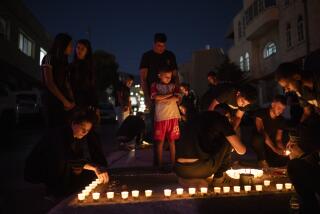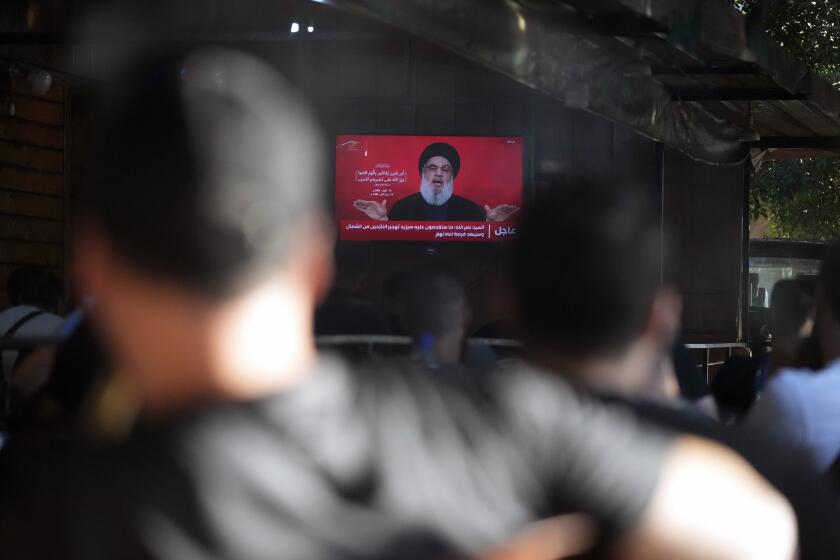Assad exudes defiance despite possible U.S. action in Syria
BEIRUT — After months of steady battlefield gains, the government of Syrian President Bashar Assad is bracing for a daunting new threat: a possible U.S. missile barrage in response to his military’s alleged involvement in suspected poison-gas attacks outside Damascus.
The Syrian leader has dismissed the accusations as “completely politicized,” while his aides called the Aug. 21 attack a rebel provocation meant to incriminate Assad and draw U.S. military action.
But more than two years into a grinding civil war that has left more than 100,000 people dead, the Syrian government seems resigned to the likelihood that it will directly face U.S. military might, a specter long considered the one development that could turn the tide of battle.
In response, Assad appears to have made several calculations: He can survive a limited strike, it won’t change the military balance in his fight with the rebels, and it may actually boost his prestige with loyalists.
In Damascus, still mostly a bastion of pro-Assad sentiment, residents have reported profound disquiet over the prospect of a U.S. attack. But there appear to be no signs of panic, such as mass abandonment of the capital.
Publicly, Assad is defiant. He has called the chemical weapons charges “preposterous,” coming at an improbable moment — as a U.N. inspection team was in Damascus and his forces were making progress on several fronts against fragmented rebel brigades. Previously, some military analysts had suggested that the Syrian military was keeping its chemical arsenal in reserve should the government start losing ground in the fight.
Assad loyalists and others have repeatedly argued that it was the rebels, not the government, who had the most to gain from a chemical strike that crossed the U.S. “red line,” and likely to trigger a Western response.
Still, Syrian officials, including the president, are framing any U.S. assault as the inevitable outcome of what Assad has always called a “foreign-backed conspiracy” against his government, not an internal uprising.
“Since the beginning of the crisis, we have been waiting for the moment that our real enemy rears his head and intervenes,” Assad recently told senior military leaders, according to Al Akhbar, a Beirut daily deeply sourced in Damascus. “This is a historic confrontation in which we shall emerge victorious.”
The Obama administration has for many months demanded that Assad step down as part of any agreement to end the fighting. Russia and China have thwarted several U.S.-backed attempts to punish Syria within the framework of a U.N. Security Council mandate.
The United States and its allies, including Turkey and Saudi Arabia, have long bank-rolled and outfitted the Syrian opposition. But the Obama administration has been reluctant to get involved directly, and increasingly worried about Islamic militants in the ranks of the rebels.
After declaring this summer that it had concluded Assad used chemical weapons on several previous occasions, the U.S. said it would start arming rebels. But the insurgents say they’ve received nothing yet from the Americans.
A campaign of missile strikes could open the door to a more robust U.S. role in the future, despite Obama’s comments Friday that any intervention would be limited.
For now, a U.S. attack is likely to last no more than several days, a “message” reportedly not designed to topple Assad or even fundamentally alter the course of the 29-month conflict.
One worry for U.S. war planners is the possibility that Assad or one of his allies, such as the Lebanon-based Hezbollah movement, could respond against Western or Israeli targets, either directly or through a terrorist attack.
But many analysts say such a move is unlikely, as long as the U.S. action does not threaten to bring down Assad. Syria has not attacked Israel despite as many as four Israeli bombardments in recent months, strikes that do not appear to have significantly degraded Syrian military capabilities.
“There’s not much Assad can do in response to a U.S. strike,” said Ramzy Mardini, a Jordan-based analyst. “A successful retaliation against U.S. interests or allies in the region will place his regime under more threat to its survival.”
But war is nothing if not unpredictable, and Syrian officials have vowed a vigorous defense.
“Syria is not an easy target,” Foreign Minister Walid Moallem said this week. “We have the means to defend ourselves, and we will surprise the other side with our means.”
Already, Assad seems to be preparing the way for a propaganda victory. He may have the opportunity to boast of his rule having outlasted direct U.S. and Israeli attacks, no small accomplishment.
Though Assad has become a hated figure to many in the Arab world, the Syrian leader maintains a significant core of support on his home turf, especially among religious and ethnic minorities and secular Syrians terrified of a takeover by Islamist extremists. The streets of government strongholds such as the coastal city of Tartus are dotted with stylized posters of army “martyrs” who have died fighting “terrorists,” as Assad labels rebel forces.
“If the strike is limited, it will raise the popularity of the regime, because it is targeted by the West and Israel,” said Maher Abu Teyr, a political analyst in Jordan. “And it will not lead to anything decisive on the ground, because the Syrian army has taken many measures to reduce the effectiveness of the strike.”
Reports have circulated that the military has emptied strategic compounds, moved missiles, aircraft and armaments to more secure sites, bolstered security, and generally done its best to shield its combat and command structure. U.S. war planners are presumably watching and adjusting some of the dozens of potential targets, a list that apparently excludes chemical weapons facilities because of the fear that poisonous substances could be released.
“We are in a state of war right now, preparing ourselves for the worst scenario,” Bashar Jaafari, the Syrian envoy to the U.N., told reporters Wednesday in New York. “What would you ask a government in this situation to do, unless to take the necessary precautions?”
An underlying concern is the prospect of a protracted U.S. involvement, a scenario both sides seem to want to avoid. A sustained display of U.S. power could trigger a new wave of terrified refugees, adding to instability in Lebanon and other neighboring nations.
“This is costing Assad,” said Joshua Landis, who heads the Center for Middle East Studies at the University of Oklahoma. “The psychological cost on Syrian supporters is tremendous. Morale is hit. The opposition has a big boost and world attention has been brought back to Syria.”
But the Syrian armed opposition, which has long called for direct Western intervention to oust Assad, called the anticipated U.S. response inadequate. Last week’s alleged chemical blitz demands a forceful rejoinder, many opposition activists argue. Some fear Assad and his loyalist forces could emerge emboldened.
Musab Abu Qatada, a spokesman for the rebel Damascus Military Council, said he didn’t understand how Washington could set an objective short of ousting Assad after a suspected chemical attack that the U.S. said killed more than 1,400 people.
“If it’s limited,” Abu Qatada said, “there is that saying: ‘What doesn’t kill me makes me stronger.’”
Special correspondent Nabih Bulos in Beirut and Times staff writer Raja Abdulrahim in Cairo contributed to this report.
More to Read
Sign up for Essential California
The most important California stories and recommendations in your inbox every morning.
You may occasionally receive promotional content from the Los Angeles Times.










